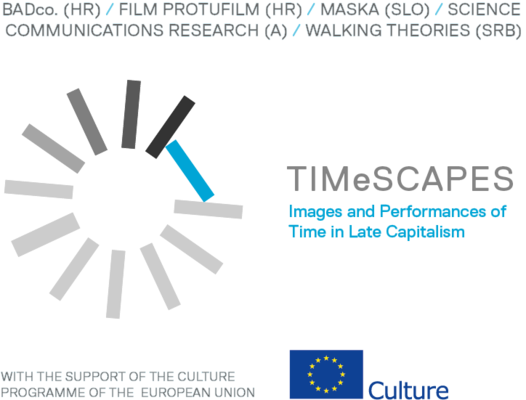TIMeSCAPES
Time and Contemporary Economic Production
The double objective is to artistically reflect the transversal issue of time that cuts across economy, society and art: structure of working time in different economic contexts temporal experience in technologies, performative dramaturgies of time, etc.; while at the same time tackling the issue that has acute resonance in cultural and academic contexts across Europe: what should the models and institutions of artistic research be, given the constraints of time, money and mobility that artists face?
“Time-scarcity” has become a relevant topic not only from a social or even medical perspective, but also as a dramaturgical and performative problem. Having developed in the 20th century in connection with the principles of Fordis, the development of contemporary performance, especially dance over the last two decades has reflected the deep changes brought about by post-Fordian modes of labour (cognitive and affective virtuosity, multi-layered temporality, proximity, collaboration processes, openness of work, etc.). In this sense, different choreographic practices should not be understood only as aesthetic practices, but also as wider social processes of distributing bodies in time and space. Simultaneously, the pervasive erosion of differences between film, television, and computers and linked temporal experiences of technologies of work, travel, communication, and vision result in new ideologies of speed and compression, which opens new possibilities to rethink elaborative slowness and strategies of recapitulation in performance.
What are the Methodologies and artistic research?
We are reflecting on the working conditions of creative workers, it contributes to the discussion of sustainability of current (short term, project-oriented and inflationary) organization of cultural work. Second, it contributes to discovering viable models ofartistic research. The communicational and experimental dimension of the project is concerned with the way artists and academics can be enabled to develop a common ground of thinking as well as sustainable methodologies and practices of production within the performing arts.
The Humanities and the Arts – as a major difference to the sciences – claim not to produce (in)contestable facts but modes of knowing and that knowing should therefore be consideredan instance that enables agency and decision-making face to face with complexity, confusion and contradictory ‘facts’. This kind of knowledge is not so much structured by the task to find solutions to problems, but takes seriously the socializing and cultivating function of maintaining problems. Seemingly unsolvable problems are often hot spots of transformational processes and should be considered privileged sites to observe antagonistic futures of society. The specific knowledge of Art and the Humanities has to be continuously performed and revised in discussion and by exposing the contingency of what can be known. We are therefore concerned with the very nature and time structure of ‚cultural knowledge’ (which can be characterized as heterogeneous assembly) but also with the question how we can find enough time to keep up the reflexivity of ‚cultural knowledge’, the slowing down effect of theory.
The arts (especially performing and visual arts) have for a long time been experimenting with elaborated cultural theories and philosophical approaches and have developed communication formats such as (fake) documentaries, participatory theatre and many different forms of interventions in public space. Moreover, they are beginning to systematically develop methods of ‘artistic research’ that operates on the intersection of aesthetic and political theory, educational practices and experimental communication. We want to pay special attention to several modes of production and communication of artistic research: interlocutive communication forms (the conversation, the dialogue) which we combine with (dramatic, visual, spatial) possibilities offered by the performing arts in order to point to a perform theory in the making; performance- and film-essays; methodological tools and workshops, etc.
Partner:
BADco , Maska , Walking Theory, Filmprotufilm
Daran arbeiten:
Karin Harrasser, Alexander Martos
This project has been funded with support from the European Commission.
This publication reflects the views only of the author, and the Commission cannot be held responsible for any use which may be made of the information contained therein.

